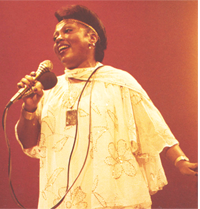|
 Abeti (Masikini, Abeti), groundbreaking Congolese singer; born Kisangani, Congo-Kinshasa, Nov. 9, 1954; died Paris (Villejuif), Sept. 29, 1994. Abeti (Masikini, Abeti), groundbreaking Congolese singer; born Kisangani, Congo-Kinshasa, Nov. 9, 1954; died Paris (Villejuif), Sept. 29, 1994.
Abeti came to Kinshasa (Léopoldville) to escape the violence that flared following Congolese independence in 1960. She had already begun to sing and play the organ in church. In Kinshasa she entered singing competitions in spite of opposition from her family. On one such occasion Abeti met Togolese impresario Gérard Akueson, then on tour with a troupe headlined by Togolese singer Bella Bellow. When Bellow left the troupe in 1971, Akueson enlisted Abeti.
Under Akueson's tutelage Abeti shed the rough edges of inexperience during nearly two years of touring around West Africa. By 1973 Akueson was able to book her at the famed Paris Olympia concert hall. While in Paris she recorded her first album, Abeti, for fashion designer Pierre Cardin's label. Then she took her show home to Kinshasa, where she was barely known, to an enthusiastic reception.
Although most Kinshasa entertainers played in night clubs, Abeti preferred "le show," select concerts in large halls performed with her band and her dancing Tigresses. Her repertoire, much of which she wrote herself, ranged widely from songs in the style of the Congolese rumba or American rhythm and blues to stories and rhythms adapted from folklore and even included a sampling of European pop.
Abeti capped her incredible ascension with a 1974 performance at Carnegie Hall and played the Olympia again in 1975. No Congolese artist had achieved so much so quickly. Her success helped other women like Mbilia Bel and Tshala Muana, both of whom served in Abeti's Tigresses, enter the male dominated entertainment business of Congo (then Zaire). In the late seventies, as the economy at home deteriorated, Abeti and her band, by then called Les Redoutables, began to record abroad. Hits of the period included the reggae-tinged "Inquietude" (1977) and the classic rumba "I Love You" (1982).
Abeti moved to Togo in 1984 when Akueson assumed management of the state-owned recording complex in Lomé. By 1986 she had become a Paris resident and champion of the speeded-up Congolese rumba known as soukous. Her 1986 soukous album Je Suis Fâché (I am angry) earned a gold record (sales of 100,000) in France. In 1989, Abeti took her act to China for a month-long tour. She released La Reine du Soukous (queen of soukous) in 1991, but her career eventually gave way to her battle with cancer.
Abeti was the most accomplished and, for much of her career, the most popular Congolese woman entertainer, the acknowledged grande dame of the music. She recorded some eighteen albums, issuing one nearly every year. Although she often borrowed from folklore, she was a champion of change. She claimed to have introduced the synthesizer to Congolese music, and she employed the drum machine and other electronic effects with great enthusiasm. Her embrace of Paris soukous enhanced a career that might otherwise have withered with the declining economy back home.
© 2011 Gary Stewart
SELECT DISCOGRAPHY
Abeti (Zika/Bade Stars LP ZK008) 1977; Cheri Badé (Dragon Phenix LP DPX829) 1981; Je Suis Fâché (Bade Stars LP AM033) 1986; La Reine du Soukous (Jimmy's LP JIP024) 1991; Souvenirs, Souvenirs (best of collection on CD, Déclic 50567-2) 1996.
SELECT BIBLIOGRAPHY
I. Follot, "A batons rompus avec la grande vedette zaïroise Abeti Masikini," Bingo (no. 270, July 1975); "Abeti: le retour," Bingo (no. 299, Dec. 1977); A. Ngoye, "Abeti la diva noire," Liberation (Dec. 2, 1983); G. Stewart, "La Reine du Soukous," The Beat (vol. 13, no. 6, 1994); B. Matoko, Abeti Masikini: La voix d'or du Zaïre (Paris, 1999); G. Stewart, Rumba on the River (London and New York, 2000).
|

